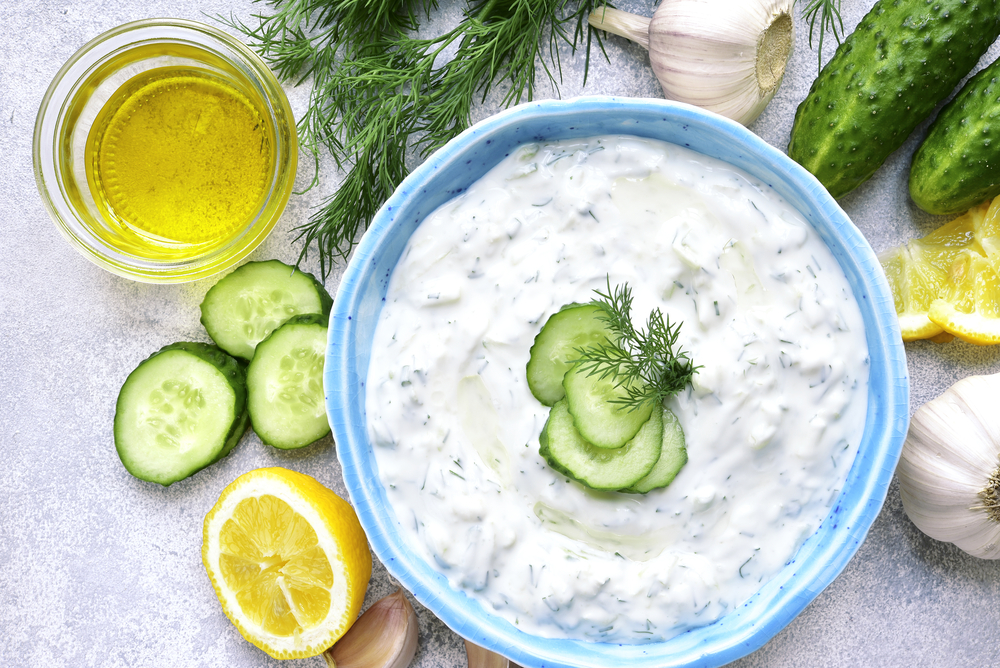In the mood for some Mediterranean cuisine? Maybe try some tzatziki! It’s a traditional Greek dip that is found in many dishes. The question today is, does it suit the keto diet? Keep reading to find out!
Tzatziki is keto as it’s a low-carb, high-fat food. The keto diet aims to put the body in a state of ketosis, meaning it uses fat for energy rather than carbohydrates. It does this when we consume a diet very high in fat and low in carbohydrates. Other keto alternatives include Chobani Whole Milk Greek Yogurt and Daisy Sour Cream.
Want to learn more about the keto lifestyle, tzatziki, and some keto-friendly alternatives? Keep reading below!
Contents
The Keto Diet
When following the keto diet, you will consume a large number of fats (about 75%-80%) and a very low percentage of carbohydrates (around 5%). This way of eating encourages your body to enter ketosis, a state that uses fat stores for energy rather than carbohydrate stores. The keto diet is primarily used for weight loss, however, has also had some positive outcomes from studies regarding diabetes, mental degeneration, and epilepsy.
What is Tzatziki?
Tzatziki sauce is a common dish found in Mediterranean cuisines. It’s made from a combination of cucumber, yogurt, and other flavorings like herbs and garlic. Tzatziki is a creamy and refreshing dish that can offset spicy flavors. Often served as a side dish, this sauce pairs well with freshly grilled meats, fish, and bread.
Tzatziki Origins
Tzatziki is a popular sauce in southeast Europe and middle eastern regions around the Mediterranean Sea. It actually originated during the Ottoman Empire and is based on a traditional Indian called raita. This dip is a cool yogurt sauce often served with spicy rice dishes to help offset the strong, hot flavor. This dip was taken back to the Mediterranean region where the Greeks started to experiment and add cucumber to the dish. Since that time, tzatziki has taken hold as a staple in the Mediterranean diet.
Benefits of Tzatziki
This dip is a mixture of two healthy ingredients, Greek yogurt, and cucumber. Greek yogurt is a high-protein food, which supports meal satiety, muscle recovery and growth, and cellular function. Meanwhile, cucumber is an antioxidant-rich, hydrating vegetable that has components that have been shown to improve blood sugar stabilization and digestion.
Different Brands of Tzatziki
While tzatziki is traditionally made at home, you can buy this sauce premade from many different brands. Next, we’ll cover some of these different brands, compare their nutritional value, and their suitability for the keto diet. We’ll also share some ideas for other keto-friendly tzatziki alternatives.
Review of Tzatziki Nutrition
Each brand has a unique recipe for their tzatziki, but they all have pretty similar components including yogurt or cultured cream, cucumber, and other flavorings like herbs and garlic. Some include preservatives, either natural or not, so make sure to check the label if additional preservatives are a concern to you. While the nutrition components vary slightly across brands, all of the above are still suitable for the keto diet.
Why Tzatziki is Keto
The keto diet encourages eating foods that are high in fat and low in carbohydrates. Tzatziki is a prime example of these types of foods. Made with full-fat dairy, it packs in the fat percentage to boost ketosis while offering only a small number of carbohydrates. Each of the above brands fits within the keto diet, but it’s still important to check the label for the carbohydrate counts if you are trying to fit within a certain range for the keto diet.
Nutritional Content of Tzatziki
Cedar’s Foods Cucumber Garlic Dill Tzatziki
The list of ingredients in Cedar’s Foods Cucumber Garlic Dill Tzatziki is:
- Yogurt (Grade A Pasteurized Skim Milk, Cream, Milk Protein Concentrate, Food Starch, Gelatin, Pectin, Cultures (streptococcus Thermophilus, Lactobacillus delbrueckii Sub Sp. Bulgaricus, Lactobacillus Paracasei, Propionibacterium freudenreichii shermanii)
- Cucumbers
- Garlic
- Sea Salt
- White Vinegar
- Dil
- Natamycin (a Natural Preservative).
Nutrition Facts (per 2 tablespoons):
- Calories: 35
- Total Fat: 1.5 g
- Saturated Fat: 1 g
- Cholesterol: 20 g
- Sodium: 5 mg
- Carbs: 3 g
- Fiber: 0 g
- Sugar: 2 g
- Protein: 2 g
Marketside Tzatziki Style Dip
The list of ingredients in Marketside Tzatziki Style Dip is:
- Cultured Cream
- Cucumber
- Garlic
- Salt
- Modified Corn Starch
- Potassium Sorbate (Preservative)
- Citric Acid
- Sugar
- Dehydrated Garlic
- Lemon Juice from Concentrate (Lemon Oil)
- Maltodextrin
- Yeast Extract
- Dehydrated Onion
- Spices
- Parsley Flakes
- Carrageenan
- Gelatin
- Mono- and Diglycerides
- Disodium Phosphate
- Carob Bean Gum
- Lactic Acid
- Natural Flavor
Nutrition Facts (per 2 tablespoons):
- Calories: 50
- Total Fat: 4 g
- Saturated Fat: 2.5 g
- Cholesterol: 15 g
- Sodium: 210 mg
- Carbs: 3 g
- Fiber: 0 g
- Sugar: 2 g
- Protein: 1 g
Kronos Tzatziki Sauce
The list of ingredients in Kronos Tzatziki Sauce is:
- Sour Dressing (Water, Canola Oil, Nonfat Dry Milk, Modified Food Starch, Guar Gum, Mono, and Diglycerides, Locust Bean Gum, Carrageenan, Lactic Acid, Citric Acid, Natural And Artificial Flavor, Xanthan Gum, Starter Distillate, Potassium Sorbate)
- Cucumbers
- Granulated Garlic
- Salt
- Garlic (Garlic, Water, Phosphoric Acid [acidifying Agent] And Sodium Benzoate [a Preservative])
- Lemon Juice Concentrate
- Sugar
Nutrition Facts (per 2 tablespoons):
- Calories: 50
- Total Fat: 4 g
- Saturated Fat: 3.5 g
- Cholesterol: 0 g
- Sodium: 70 mg
- Carbs: 2 g
- Fiber: 0 g
- Sugar: 1 g
- Protein: 1 g
Boar’s Head Tzatziki Greek Yogurt Dip
The list of ingredients in Boar’s Head Tzatziki Greek Yogurt Dip is:
- Greek Yogurt (Pasteurized Grade A Skim Milk, Cream, Milk Protein Concentrate, Tapioca Starch, Pectin, Enzymes, Live and Active Cultures: S. Thermophilus, L. Bulgaricus, L. Acidophilus, Bifidus, and L. Casei)
- Cucumbers
- 2% or Less:
- Salt
- Dill
- Garlic
- Vinegar
- Natamycin (a Natural Preservative)
Nutrition Facts (per 2 tablespoons):
- Calories: 30
- Total Fat: 2 g
- Saturated Fat: 1.5 g
- Cholesterol: 5 g
- Sodium: 125 mg
- Carbs: 1 g
- Fiber: 0 g
- Sugar: 1 g
- Protein: 1 g
Alternatives
Chobani Whole Milk Greek Yogurt, Plain
 If you can’t get your hands on some tzatziki or you’re just in a pinch, use plain Greek yogurt! It’s already one of the main components of tzatziki, so it offers some of the same flavors and a similar creamy texture. It is very high in protein and fat; therefore it is a great choice for the keto diet. Replace tzatziki with Greek yogurt in salads, sandwiches, dips, and platters.
If you can’t get your hands on some tzatziki or you’re just in a pinch, use plain Greek yogurt! It’s already one of the main components of tzatziki, so it offers some of the same flavors and a similar creamy texture. It is very high in protein and fat; therefore it is a great choice for the keto diet. Replace tzatziki with Greek yogurt in salads, sandwiches, dips, and platters.
The list of ingredients in Chobani Whole Milk Greek Yogurt, Plain is:
- Cultured Pasteurized Nonfat Milk
- Cream
- Live And Active Cultures:
- Thermophilus
- Bulgaricus
- Acidophilus
- Bifidus And L. Casei.
Nutrition Facts (per 2 tablespoons):
- Calories: 28
- Total Fat: 1.5 g
- Saturated Fat: <1 g
- Cholesterol: 6 g
- Sodium: 10 mg
- Carbs: 1 g
- Fiber: 0 g
- Sugar: <1 g
- Protein: 3 g
Daisy, Regular Sour Cream
 Sour cream is another great option to use as an alternative to tzatziki. Another probiotic, this dip has a similar tangy flavor, creamy texture, and high-fat content. It is keto-friendly and quite frankly just a super simple ingredient. Use it in the same way that you would with tzatziki, on salads, bowls, sandwiches, and dips. You can also mix in other flavorings with sour cream to switch up the flavor and compliment any dish.
Sour cream is another great option to use as an alternative to tzatziki. Another probiotic, this dip has a similar tangy flavor, creamy texture, and high-fat content. It is keto-friendly and quite frankly just a super simple ingredient. Use it in the same way that you would with tzatziki, on salads, bowls, sandwiches, and dips. You can also mix in other flavorings with sour cream to switch up the flavor and compliment any dish.
The list of ingredients in Daisy, Regular Sour Cream is:
- Cultured Cream
Nutrition Facts (per 2 tablespoons):
- Calories: 60
- Total Fat: 5 g
- Saturated Fat: 3.5 g
- Cholesterol: 20 g
- Sodium: 15 mg
- Carbs: 1 g
- Fiber: 0 g
- Sugar: 1 g
- Protein: 1 g
Keep in mind that there are many recipes online for homemade tzatziki sauces that are keto-friendly. If you would rather make this recipe at home or want to get creative, doing a quick google search will bring up many different tzatziki recipes to try.
Final Thoughts
Tzatziki is a traditional Mediterranean sauce that is used for many different dishes. It is traditionally made with healthy ingredients like Greek yogurt and cucumber, which offers many health benefits. Because it is a high fat, low carbohydrate food, tzatziki is suitable for the ketogenic diet and supports ketosis. Add this dip to any keto recipe including salads, bowls, sandwiches, and platters. You can swap tzatziki out with some other keto-friendly creamy dairy products such as plain Greek yogurt or plain sour cream.
Related Questions
Is tzatziki dairy-free?
No, tzatziki is traditionally made with dairy products, including yogurt and/or sour cream. Some cultured dairy products are more easily digested than those without cultures for those with lactose intolerance, though, so if that is an issue for you, this product may be suitable.
Is tzatziki vegan?
No, tzatziki contains animal-derived products and is therefore not vegan. It is vegetarian, though, because it does not contain any animal flesh or parts.
Is tzatziki sugar-free?
Most brands produce tzatziki without added sugars, so generally, this product is sugar-free. However, make sure you check the label to ensure that the brand you have chosen is free of added sugars.
Is tzatziki gluten-free?
Yes, tzatziki is gluten-free because it is not made with any gluten-containing products such as wheat or barley. However, check the label to ensure there is no cross-contamination if that is a concern to you.
Is tzatziki low in fat?
No, tzatziki is often made with high-fat dairy products, therefore it is not a low-fat food. While this is good news for those on the keto diet, people that want a dip that is lower in fat may want to make their own tzatziki with fat-free yogurt.
